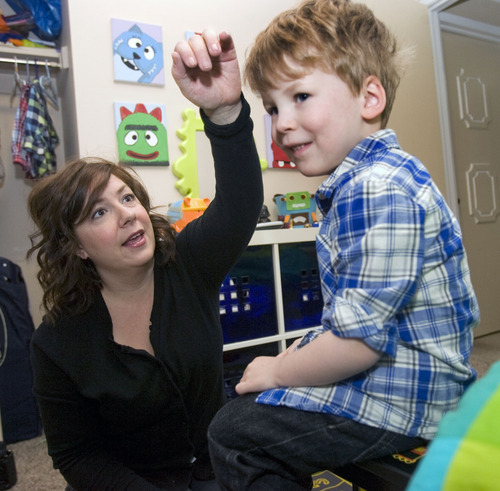This is an archived article that was published on sltrib.com in 2012, and information in the article may be outdated. It is provided only for personal research purposes and may not be reprinted.
Becky Kemp Carpenter's dad, a Vietnam War veteran, died two years ago of ALS, better known as Lou Gehrig's disease. So when she heard about the Million Veteran Program to help medical research, she — a third-generation veteran — didn't hesitate to sign up.
"I come from a strong history of service," said Carpenter, who was one of 35 veterans enrolled Thursday during the program's formal kickoff at the George E. Wahlen Department of Veterans Affairs Medical Center.
"By doing a simple blood test and answering questions, we can help not just future vets but people who are around now," said Carpenter, a West Valley City resident who served in the Air Force in the 1990s. "There is so much more we can continue to do to serve our country."
Begun last year in Boston, the Million Veteran Program has so far enlisted more than 20,000 veterans to donate their DNA and release their VA medical records to researchers. The VA in Salt Lake City is one of 40 hospitals participating so far and has enrolled more than 300 veterans since fall; the program hopes to have 50 participating hospitals by summer.
The idea is to build an ongoing database that will allow large-scale genetic and genomic studies, much as the Nurses Health Study begun at Harvard in the 1970s is allowing researchers to track the health of 50,000 nurses, says Laurence Meyer, chief of research at the VA hospital in Salt Lake City.
Only this is bigger, Meyer said.
Six million veterans get ongoing medical care through the VA, and if only 1 million of them sign up, that will be a huge database of continually updated medical records, he said.
"It's going to be an incredibly rich resource," said Joann Boughman, executive officer of The American Society of Human Genetics. The VA is "way ahead of the rest of the world in electronic records" and is being advised by top-notch geneticists, she said.
"We can get gene sequences forever, but if we can't correlate them with disease or health then we are not getting to where we want to be," Boughman said.
Besides its size, which is of great value, the VA's program will have the DNA of an ethnically and economically diverse population, she said.
"That's a downside of many of the big population genomic studies. So many [participants] are of northern European descent."
The data is available to VA researchers and those from affiliated hospitals, such as the University of Utah. The first research project approved using the MVP data is looking into serious mental illness, which afflicts many veterans as well as the general population.
"We're trying to find genetic markers to help us understand functional disability," said Meyer. "What makes them fail to take their meds or stay within a family?"
JD LeBlanc, a Vietnam veteran who served a total of 47 years between active duty, Reserve and Guard stints, drove from American Fork to enroll in the Million Veteran Program on Thursday. "Anything I can do to help future vets is worthwhile," said LeBlanc, who uses a cane after twice breaking his back and once breaking his neck.
Robert Stephens of Clearfield, who was an assistant Army chaplain in the Vietnam War, was at the VA for a regular appointment when someone steered him toward the kick-off. "We have to help each other," Stephens said, shortly after signing the nine-page contract that spells out the privacy policy and other matters. He donated what amounted to two teaspoons of blood.
Jan Fales, who enrolled with her husband, Elden Fales, said she wondered what took researchers so long to recognize veterans as a resource.
"It's a captive audience. They know who we are."
Learn more
Get details of the Million Veteran Program at http://www.research.va.gov/mvp or call 866-441-6075, also the number for an appointment to enroll.
The program, adjacent to the internal medicine clinic on the ground floor of Salt Lake City's VA hospital, 500 Foothill Drive, also takes walk-ins from 7 a.m. to 4:30 p.m. Monday through Friday.





